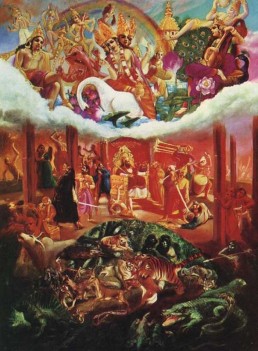Gita Chapter 14 – Verse 16 « »
कर्मणः सुकृतस्याहुः सात्त्विकं निर्मलं फलम् ।
रजसस्तु फलं दुःखमज्ञानं तमसः फलम् ॥ १४-१६॥
karmaṇaḥ sukṛtasyāhuḥ sāttvikaṃ nirmalaṃ phalam
rajasastu phalaṃ duḥkhamajñānaṃ tamasaḥ phalam 14-16
The fruit of good action, they say, is SATTVIC and pure; verily, the fruit of RAJAS is pain, and the fruit of TAMAS is ignorance.
karmaṇaḥ = of work; sukṛtasya = pious; āhuḥ = is said; sāttvikaṃ = in the mode of goodness; nirmalaṃ = purified; phalaṃ = the result; rajasaḥ = of the mode of passion; tu = but; phalaṃ = the result; duḥkhaṃ = misery; ajñānaṃ = nonsense; tamasaḥ = of the mode of ignorance; phalaṃ = the result.;

